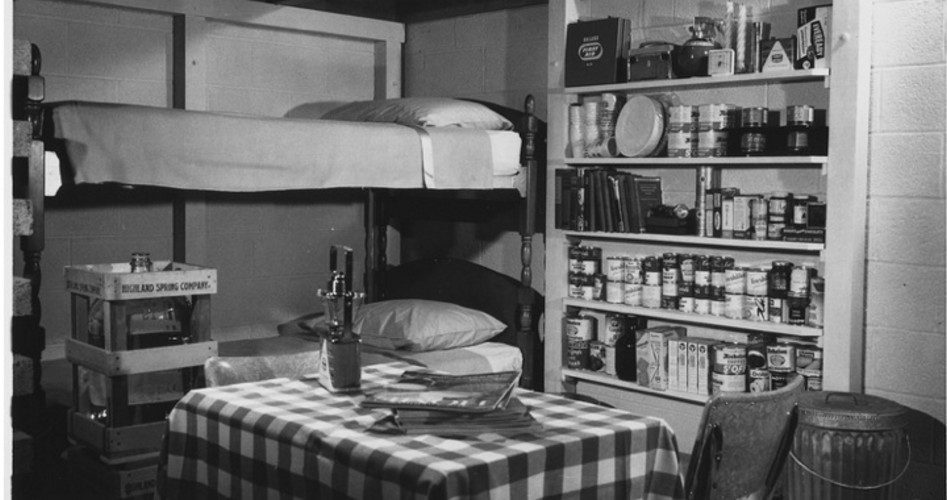
On Saturday, the editors at the New York Times decided to print Alan Feuer’s story of his odyssey into the fringes of society — the “preppers,” those people who are preparing for some type of national collapse, often the insolvency of the U.S. financial system.
Feuer, a reporter for the Times who has determined for himself that the U.S. economic system is set for a major shakeup, including high levels of price inflation, said he became concerned about his financial future somewhere “between the fall of Lehman Brothers [in 2008] and the corresponding rise of quantitative easing when it occurred to me … that the financial system was appallingly unstable and that the realm of the possible now included a disruptive reduction in the value of our money.”
With only occasional barbs thrown at “preppers,” such as derisively commenting about people who believe that “bug out bags” — kits or backpacks filled emergency supplies — were somehow sufficient to see people “through the collapse of civilization,” Feuer reported on a vast network of people and corresponding websites devoted to the idea of “preparing for the worst,” or The End of the World as We Know It, each with differing views of the coming cataclysm.
What he found was vastly different from what he expected:
To the unprepared, the very word “prepper” is likely to summon images of armed zealots hunkered down in bunkers awaiting the End of Days, but the reality, at least here in New York, is less dramatic.
Local Preppers are doctors, doormen, charter school executives, subway conductors, advertising writers and happily married couples from the Bronx. They are no doubt people that you know — your acquaintances and neighbors. People, I’ll admit, like myself.
Of course, as is fitting with “The Newspaper of Record,” a leftist lean was clearly evident. Feuer showed his disdain for people who believe that many of the world’s wealthiest people work in a concerted fashion to influence the direction of international politics — even though the wealthy often admit to doing that very thing: “Prepping” to the uninitiated or deliberately misinformed, he said, “continues to be thought of as a marginal and unseemly business, something on par with believing that the Bilderberg Group controls world events.”
But he determined that, for the most part, prepping was a very rationale endeavor, even participating himself. He started his journey by purchasing some silver coins as recommended by a friend, and then some freeze-dried food (in both the standard and vegetarian options), and then “began the conversation about acquiring a gun.”
He found intelligent people of sound mind to help him along his journey to understanding not only how to prepare but to also understand the mindset of those further along the same journey. He interviewed Aton Edwards, a prepper with credibility and a membership of 30,000 people belonging to his International Preparedness Network. Edwards is also the author of Preparedness Now which is into its second revision, and a frequent guest on radio and television in New York City. Edwards disabused Feuer of any idea that “preppers” were aliens from another planet. The prepper “movement,” as he now calls it, is simply a “mishmash of people you could … find — black, white, men, women, everyone. It looks like America.”
Feuer went further, interviewing Dr. Irwin Redlener, a professor at Columbia University and an expert in “disaster preparedness”, the PC alternative to “prepping.” Redlener said such thinking was “rational” and he recommended that Feuer, along with everyone else, “have a three-day supply of food and water, a working flashlight, a first-aid kit, a portable radio, and a plan…. A prepared citizen is someone who understands how to take care of himself, who has amassed the necessary items, who has a plan.”
The main point, according to Redlener, was not to go overboard:
There’s a spectrum. On one end is mindless complacency. On the other is paranoia. The challenge is to find that place in the middle where you understand that bad things can happen, but it doesn’t consume your life.
For some, including James Wesley Rawles, prepping totally consumes their lives. His website, survivalblog.com, attracts 300,000 unique visitors every week, and he is the author of numerous books, including the best-seller Patriots: Surviving the Coming Collapse, and spends whatever free time he has left doing individual counseling at $100 an hour.
A brief scan of his website lists dozens of prepper topics such as “Emerging Threats” with 943 links, “First Aid/Medical” with 687 links, “G.O.O.D.” [Get Out of Dodge] with 591 links, “Retreat Security” with 664 links, and “Survival Mindset” with 1,083 links.
What’s missing is any mention whatsoever of links to websites devoted to keeping the impending disaster of martial law and totalitarianism from happening in the first place. There is nothing under “Education” or “Constitution” or “Political Action.” There are no links to organizations attempting to influence legislators, or raise young people in the principles of Americanism. There is nothing about homeschooling or petitions. There are no links to activist groups such as The John Birch Society.
Instead, all energy is being directed into prepping, preparing for the worst, bugging out, hiding out, retreating from civilization as it breaks down.
Famed author Aleksandr Solzhenitsyn, who wrote about the atrocities in Communist Russia, had some harsh words for those who directed their attention away from restoring freedom and concentrated instead on trying to save themselves. In his book The Gulag Archipelago, Solzhenitsyn decried the people who thought they could avoid coming holocaust:
During an arrest, you think since you are not guilty, how can they arrest you? Why should you run away? And how can you resist right then? After all, you’ll only make your situation worse….
And how we burned in the camps later, thinking: What would things have been like if every Security operative, when he went out at night to make an arrest, had been uncertain whether he would return alive and had to say goodbye to his family?
Or if, during periods of mass arrests, as for example in Leningrad, when they arrested a quarter of the entire city, people had not simply sat there in their lairs, paling with terror at every bang of the downstairs door and at every step on the staircase, but had understood they had nothing left to lose and had boldly set up in the downstairs hall an ambush of half a dozen people with axes, hammers, pokers, or whatever else was at hand?
The Organs would very quickly have suffered a shortage of officers and transport and, notwithstanding all of Stalin’s thirst, the cursed machine would have ground to a halt!
We did not love freedom enough. Every man always has handy a dozen glib little reasons why he is right not to sacrifice himself.
That is the meme that the Times is apparently promoting now with the publishing of Feuer’s article: Prepping is now politically correct as it draws time, energy, and resources away from real effective resistance to tyranny.
A graduate of Cornell University and a former investment advisor, Bob is a regular contributor to The New American and blogs frequently at www.LightFromTheRight.com, primarily on economics and politics. He can be reached at [email protected].



